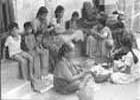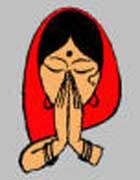Gifts
Small gifts are acceptable as tokens of gratitude for hospitality.
India and the tourist |
   |
India and the tourist |
   |
Some Common Indian Customs & Traditions
|
|
|
When you judge my religion you take it that yours is perfect and mine wrong; and when you criticise the society of India you suppose it to be uncultured just so far as it does not conform to your
standard. That is nonsense." |
|
 |
Gifts
Small gifts are acceptable as tokens of gratitude for hospitality.
|
 |
Greeting with a kiss
It is common practice in the West to greet friends with a fond kiss. Indians
don't believe in showing their emotions or feeling by kissing openly in public.
Public show of affection is generally disapproved.
|
 |
Handshake
Except in the big cities, in general, Indian women prefer not to shake hands.You are safe with a Namaste. The Sanskrit word Namaste means 'I bow to the divine in you.' |
 |
Joint Family
Family plays an important role in India. Life of most the people is cantered
around family. It is common for several generations to live in the same house
as an extended family or joint family. When a woman marries, she leaves her
family and become a member of the husbands family. Traditional marriage is
still arranged by parents. Dowry is prohibited by law, but it is still a common custom.
|
 |
Lakhs and crores
Large amounts in India are calculated in Lakhs and crores. A Lakh is hundred
thousand and a crore is ten million. The numbers are written as 1,00,000
instead of 100,000 - it is one Lakh and not 100 million. 1,00,00,000 instead
of 10,000,000,. This is one crore and not ten million.
|
 |
Language
English is widely used in commercial circles, so there is little need for
interpreter and translation services. Business cards are usually exchanged.
|
 |
Namaste
Every social gathering follows a certain convention. The Indian greeting
is to fold the hands and tilt the head forward to Namaste. In the
metropolis and bigger towns the people of the business community and
professionals shake hands. When introduced to someone wait and see if
your host greets you with a namaste or offers the hand.
|
 |
Right hand is preferred
Don't give or take anything with your left-hand. Don't touch any holy object
with feet or with the left hand.
|
 |
Rules at the holy places
Always follow the rules published in the notice boards of holy places,
which may also include “leather objects are not allowed”, or "
menstruating women not permitted.How to conduct yourself inside a Hindu temple |